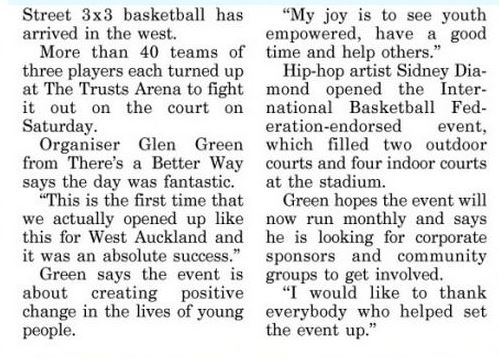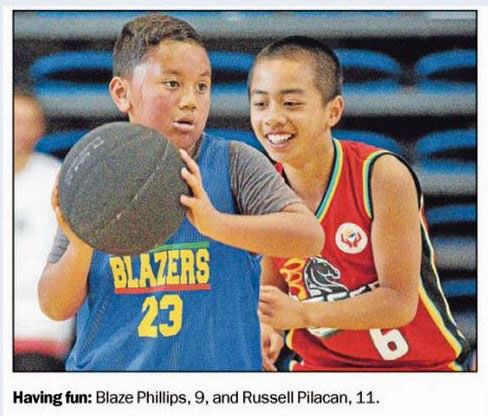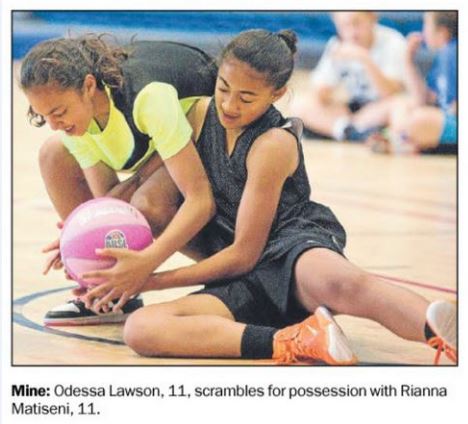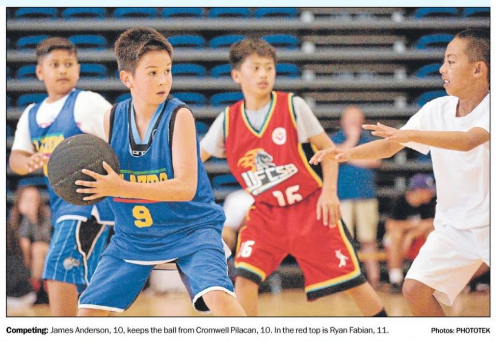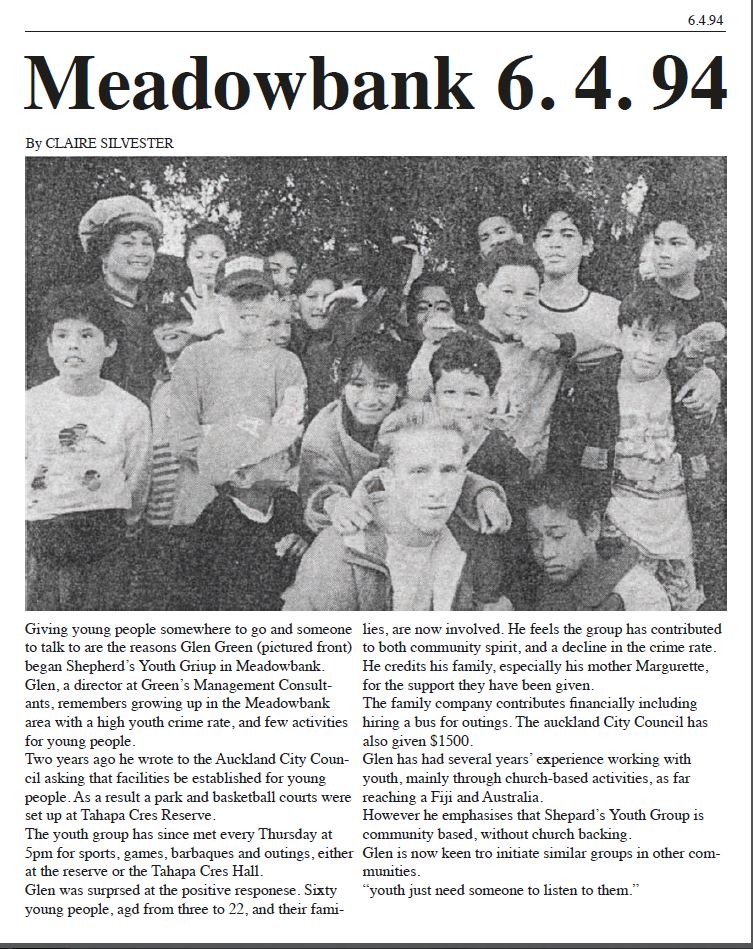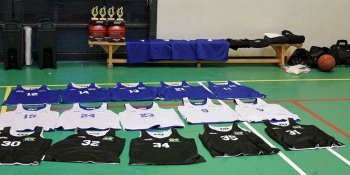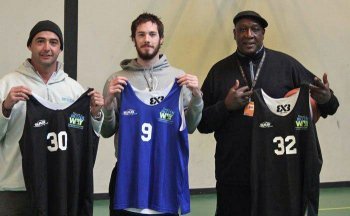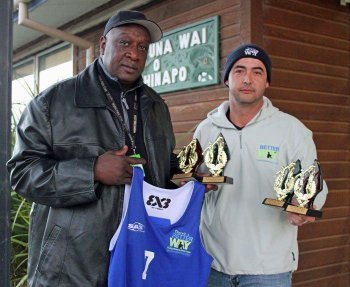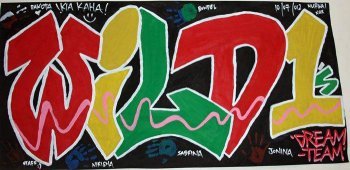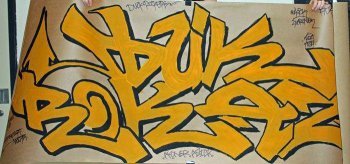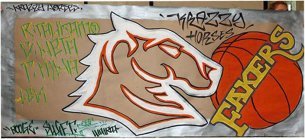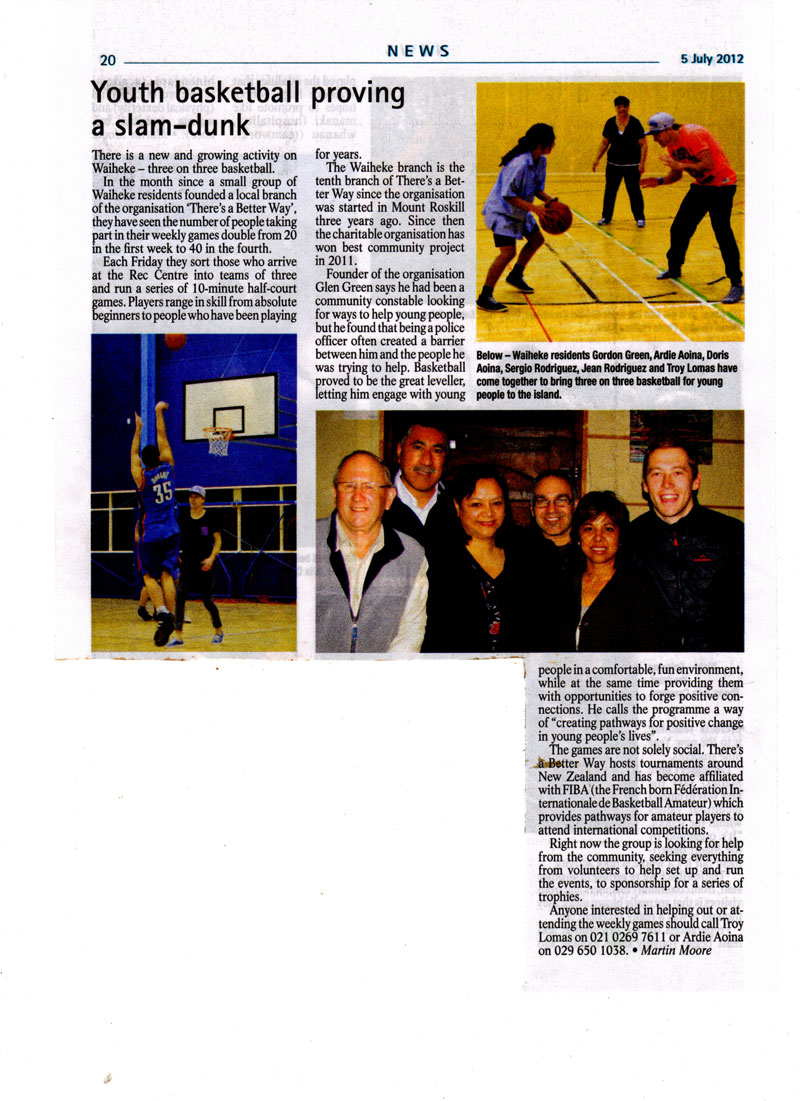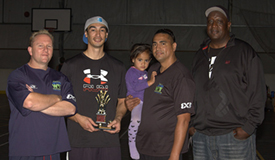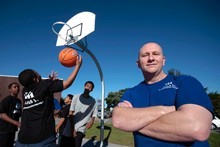|
To hear interview between Glen Green & Will, of PODFellas , please click on image.
Will introduces PODFellas , then interview with Glen.
Thank you Will.
|
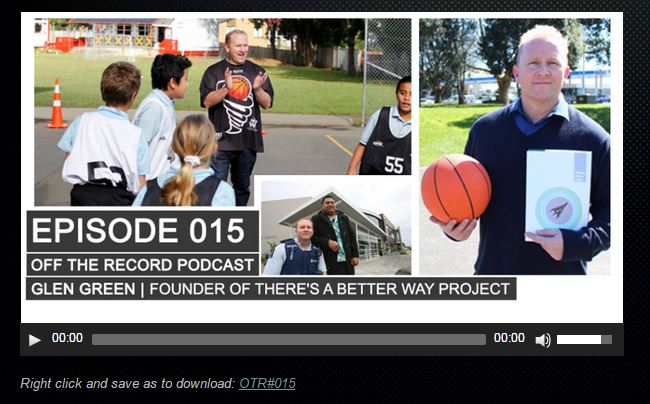 |


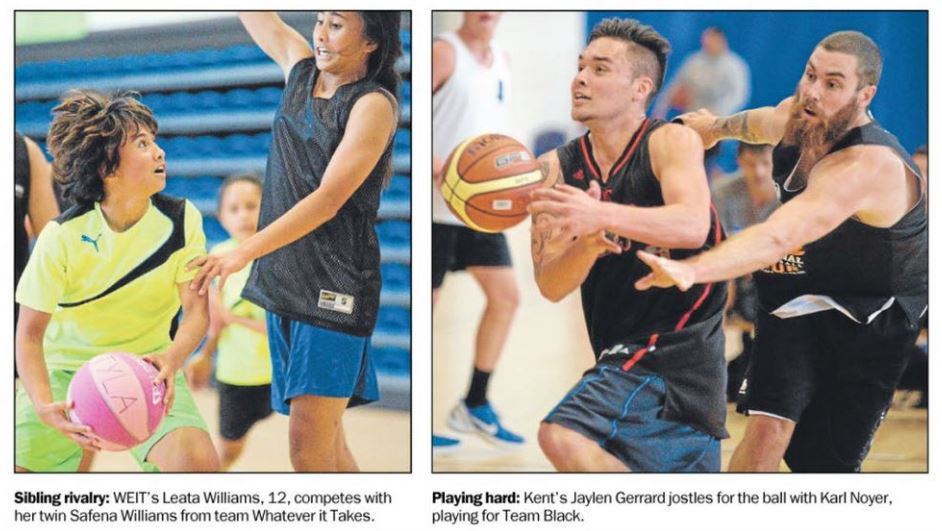
Mobile basketball court a slam dunk against crime
For many young Kiwis, the lure of gang culture can be overwhelming. But one former Auckland constable thinks there's a better way.
Reporter
For many young Kiwis, the lure of gang culture can be overwhelming. But one former Auckland constable thinks there's a better way, and it involves basketball on wheels.
It's called the Guardian – a fully mobile, purpose-built basketball setup. It's worth more than $90,000 and folds out the back of a trailer, complete with a professional-grade court.
"We can roll into any area, any street, any school and let the youth of New Zealand experience a world-class facility, without charge," says Glen Green, CEO of charitable foundation There's a Better Way.
During his time as a police officer in Mt Roskill, Mr Green used basketball as a way of building trust with local youth. The Guardian basketball system is an extension of that.
"It's that opportunity to be able to get to know the youth on a grassroots level, build a relationship with them, using sport as a pathway; and then once you get to know the youth, then you can tackle some of the deeper issues."
Recently the Guardian was at Rongomai School in south Auckland. Principal Matt Williams says it reaffirms what the school tries to teach its students.
"Making those right decisions, choosing the right direction, choosing the right path, taking risks – not being afraid to take risks you know," says Mr Williams.
"Dream big, because sometimes what they see outside in the community is not great – they need to realise there's a bigger world out there."
Mr Williams says there should be more charities like There's a Better Way. In the past three years Mr Green's foundation has reached more than 20,000 young people, from schools in Auckland to prisons in the South Island.
"I just think that we can do better as a community," he says.
"I believe it's not just up to the police, it's not just up to the Government – this is a community issue, and the only that way we can tackle this is together. And you know through basketball, people laughed at me when I first presented this idea – no one's laughing now."
And Mr Green has a message for young people who may be tempted by gangs.
"Alcohol, weapons, drugs: it's not the way. It's just going to end in death and violence. Why don't you come and practice basketball, play basketball, challenge on the court. Challenge on the system here you know, bring out your skills. It brings teamwork together, a sense of belonging. And fight on the court – if you lose, you go home and practice, and that's it."
But despite its success, the future of the Guardian is uncertain. Mr Green needs more funding to keep the programme going.And with 150 schools on the waiting list for a visit, he reckons it would be money well spent.
3 News
Read more:
http://www.3news.co.nz/nznews/mobile-basketball-court-a-slam-dunk-against-crime-2014081509#ixzz3Gr8hFzP5
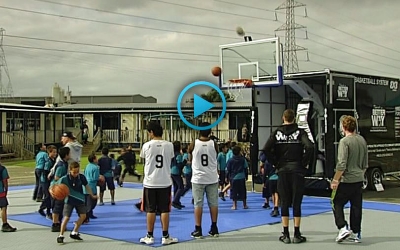 Mobile basketball court a slam dunk against crime | NZNews | 3 News
Mobile basketball court a slam dunk against crime | NZNews | 3 News

United front essential
ADRIAN EVANS
Last updated 05:00 12/09/2013
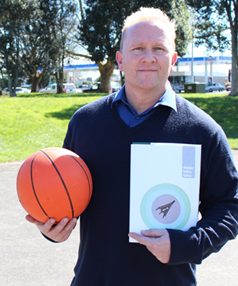 GAME ON: Manu Tukutuku creator Glen Green is ready to take flight.
A kite designed to bring people, organisations and resources together is launching tomorrow and aims to take the Otara community with it.
Manu Tukutuku is the brainchild of social change advocate Glen Green, founder and chief executive of There's A Better Way.
Better known for his basketball-based programmes, the former police constable was courted by the Otara-Papatoetoe Local Board to develop a collective impact model that could align and empower community groups in Otara.
"Every community has their differences but the key is to encourage communities to imagine, believe, take ownership and be accountable. The first major key is making sure the vision is clear and concise. The success of Manu Tukutuku lies in the generosity of the community giving back and supporting one another," he says.
The collective impact model comes out of Stamford University in the United States and is ideal for Otara local board deputy chairman Stephen Grey says.
"The community is one of the most vibrant in the country and full of a number of good people working hard to better the lot of their community."
The framework is based on a Maori kite and has three parts.
It includes the kite representing teamwork and a common goal, the wind representing motivation, communication and momentum and the cord representing navigation and control.
Backed by a $19,000 local board grant to ensure continuity through to the end of the year, Mr Green has been working alongside the Otara Network Action Committee to refine the Manu Tukutuku model.
Committee chairman Bill Takarei is excited about the project and hopes it lasts beyond the upcoming local government elections.
‘The real component is strong community leadership. The failing of it will be the lack of resources and the follow through. But we've taken things in good faith and we‘re willing to be that cord of navigation."
"The focus is Otara, but that's not new so we're holding Glen and the local board accountable."
Manu Tukutuku launch, 11.45am, October 13, Otara Leisure Centre.
- © Fairfax NZ News
GAME ON: Manu Tukutuku creator Glen Green is ready to take flight.
A kite designed to bring people, organisations and resources together is launching tomorrow and aims to take the Otara community with it.
Manu Tukutuku is the brainchild of social change advocate Glen Green, founder and chief executive of There's A Better Way.
Better known for his basketball-based programmes, the former police constable was courted by the Otara-Papatoetoe Local Board to develop a collective impact model that could align and empower community groups in Otara.
"Every community has their differences but the key is to encourage communities to imagine, believe, take ownership and be accountable. The first major key is making sure the vision is clear and concise. The success of Manu Tukutuku lies in the generosity of the community giving back and supporting one another," he says.
The collective impact model comes out of Stamford University in the United States and is ideal for Otara local board deputy chairman Stephen Grey says.
"The community is one of the most vibrant in the country and full of a number of good people working hard to better the lot of their community."
The framework is based on a Maori kite and has three parts.
It includes the kite representing teamwork and a common goal, the wind representing motivation, communication and momentum and the cord representing navigation and control.
Backed by a $19,000 local board grant to ensure continuity through to the end of the year, Mr Green has been working alongside the Otara Network Action Committee to refine the Manu Tukutuku model.
Committee chairman Bill Takarei is excited about the project and hopes it lasts beyond the upcoming local government elections.
‘The real component is strong community leadership. The failing of it will be the lack of resources and the follow through. But we've taken things in good faith and we‘re willing to be that cord of navigation."
"The focus is Otara, but that's not new so we're holding Glen and the local board accountable."
Manu Tukutuku launch, 11.45am, October 13, Otara Leisure Centre.
- © Fairfax NZ News
Basketballers want to face world’s best
By ELI MWAIJUMBA
www.westernleader.co.nz SPORT
The Super City Rangers are making an urgent call to the public to help them play against some of the best young talent in the world.
Dune Bailey, 21, Houston ORiley, 23 Johnathan fesolai, 27 and Shea Lli, 20, need financial support for air fares to compete in the FIBA 3on3 Tokyo Masters basketball competition which is starting in less than a week.
There’s A Better Way charity runs 3on3 basketball in New Zealand and is partially funding the teams trip to Japan.
If the team members can’t find sponsorship for flights in time. They will have to dig deep and pay out of their own pockets.
Charity chief executive Glen Green says it is becoming challenging flying a team to compete.
“We’re looking for help with travel and the running of our New Zealand qualifying tournaments. “ “We’re using 3-on-3 game to reach out to our communities. It’s a solid pathway for our youth to compete on the world stage and also to be able to win and get to that professional level.”
Mr Green has been working closely Waitakere West Auckland Basketball and received great support from coaches Ollie Bryce and Aik Ho.
Last year they raised $45,000to send a team to Russia for the same tournament where they lost narrowly in the quarter finals. Three- on- three basketball is one of the fastest- growing sports in the world and Rangers power forward Bailey says it is opening doors .
“In rugby they have sevens, now we’ve got 3-on-3. If we don’t make the Tall Blacks we’ve got another pathway now, which is awesome.
It’s given me an opportunity to stay in the game.
I’m mentoring and coaching young kids all over Auckland.” The tournament winner receives US$10.000 (NZ$12,750) and can compete in the FIBA 3-on-3 World Tour final in Istanbul, Turkey, later in the year.
.Call Glen Green on 021 810 095
Or go to www.theresabetterway.org.nz if you want to help the team
|
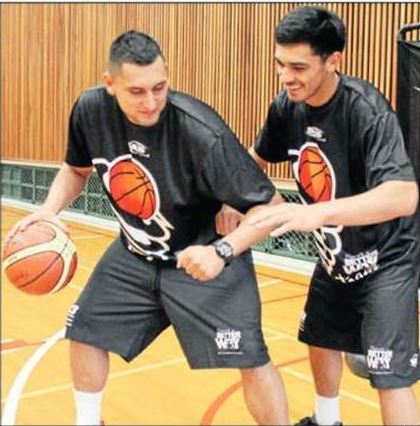 |
Sideline Champs: Showing kids a better way
By
Russell Blackstock
5:30 AM Sunday Jun 2, 2013
Ex-policeman's street basketball programme teaches respect and good behaviour to prevent children turning to a life of crime.
Glen Green has started a basketball initiative for troubled youth in South Auckland. Photo / Michael Craig
As an Auckland police officer, Glen Green felt he was wasting his time arresting wayward youngsters, already on a depressing merry-go-round of crime and punishment.
He believed there had to be another way of getting the kids on to the straight and narrow than simply locking them up every other weekend.
So, two years ago, Green made a brave move. The dad of three packed in his job as a community constable at Mt Roskill and launched a project that introduced troubled youths to 3x3 street basketball.
"It was very frustrating sending young people to jail where they would learn even more criminality and get into even more trouble when they were out," he says.
"Most weren't bad kids at all. They just needed help and encouragement to change their lives around. About 70 per cent of them had no positive role models in the family."
Today, Green and backer Bhav Dhillon are among the first winners of the
Herald on Sunday Sideline Champs Awards 2013, in association with McCafe.
The newspaper has launched Sideline Champs, a far-reaching campaign to support good behaviour on the sports sidelines and to back the work being done to combat increasing numbers of abusive fans.
Street basketball rescuing kids from a life of crime and poverty - it sounds like the script of a Hollywood movie. But the results of Green's "There's A Better Way" initiative seem impressive.
Hundreds of youngsters and families soon signed up to his scheme and crime rates in Mt Roskill began to drop noticeably.
Local businessman Dhillon spotted the difference. When he heard Green had been funding fishing trips, barbecues and leadership camps out of his own pocket, he offered financial assistance.
The result is a programme that is mushrooming nationally. Five regions around New Zealand now have branches. Soon there will be a nationwide tie-in with the YMCA.
Green, 43, is also taking his message to primary schools in South Auckland, like Holy Cross in Papatoetoe. He organises popular 3x3 competitions and spreads the word about the importance of good behaviour and respect towards others.
"We want good attitudes to become the norm, instead of them having aspirations to join gangs."
In Northland, reformed drug dealer Peter Poharama believes starting his own branch of the scheme has pulled him back from the brink. He has more than 100 youngsters involved in street basketball hubs at Kerikeri, Doubtless Bay, Kaitaia and Kaikohe. Poharama, 36, passes on his experiences of giving up alcohol, drugs and crime.
"I was brought up on booze and drugs and a lot of my family went to prison, me included.
"I am trying to use my experience to help others from falling into the same trap."
In Christchurch, "There's A Better Way" organiser Luis Arevalo has gone one step further. He has introduced the initiative to young offenders' institutions, including the notorious youth justice residence at Rolleston.
At a recent tournament at Rolleston, he invited District Court Judge Jane McMeeken to hand out prizes.
"The judge had put many of the youngsters in there and she was delighted to see them so engaged with the sport. Our plan is to next have teams from the outside visiting Rolleston for games."
Basketball parents and supporters are generally regarded as being better behaved than those involved in rugby, league and soccer. It is reckoned about 70,000 people are playing the sport at an organised level in New Zealand, and 50,000 are registered players - making basketball the biggest winter sports code after rugby, football and netball.
Unlike most other codes, there are no national-level initiatives to encourage good courtside behaviour at basketball matches, says Iain Potter, chief executive of Basketball NZ. Some regions have adopted their own programmes.
In Invercargill, the Southland Basketball Association teamed with a local family violence group to spread the word that any form of physical and verbal abuse is not on.
"Basketball is a physical game and there is a lot of passion in the stands," Potter says. "Occasionally we have some over-enthusiastic parents having a go, mainly at the referees, but fortunately most people are well behaved.
"However, the sport is growing extremely fast at a recreational level and we have to make sure that this good behaviour is maintained. I applaud initiatives like "There's A Better Way" that perform a good, strong community role."
Despite the squeaky-clean reputation, there have been a few blips along the way.
Jacqui Nassau, operations manager at College Sport Auckland, recalls hearing of a shocking incident following a tensely-fought school game.
"I have heard some pretty extreme stuff, including one parent who tried to run down a basketball referee in a school carpark after a match two years ago. We have to get a consistent message across that bad behaviour is not acceptable."
Melony Wealleans, referee coordinator for Basketball NZ, has been officiating for almost 30 years. She insists most of the aggro directed at refs comes from players and coaches, rather than supporters.
"The coaches are more aggressive at junior level but a lot of that stems from them being volunteers." More education would help, she says.
Meanwhile, back in Papatoetoe, Green is being mobbed by pupils at Holy Cross primary, excitedly queuing to have their free basketball shirts autographed. "This is what it is all about," he grins. "If we can get the attention of kids at this age and sustain it, whole communities could be saved from a lot of grief."
For more information, go to:
www.theresabetterway.org.nz
-
Herald on Sunday
By
Russell Blackstock
3-on-3 basketball growing in popularity
MARC HINTON
Last updated 12:22 10/02/2013
Rugby has sevens, cricket has T20, and now basketball's abbreviated version is hoping to ride a wave of success all the way to the Olympics.
3-on-3 basketball is getting a serious push from international governing body Fiba, with plans already in motion to have the short-form version of the world's second most popular sport fast- tracked all the way to the Olympics, a la beach volleyball.
And the wave of popularity surrounding this fast-paced street version of the game, which has been around for decades, is already being felt in New Zealand where Auckland-based, Basketball NZ-backed organiser Glen Green faces such demand for events that he simply can't keep up.
Green, who runs 3-on-3 tournaments and exhibitions through his There's A Better Way community programme, has brought out three acclaimed New York streetballers to feature in his latest push for the sport.
The Uptown 214 team, led by New York streetball legend Aaron "The Problem" Williams, is the feature act that is taking in a number of stops in Northland, Auckland and Waikato over the next week or so.
Feature appearances include a halftime exhibition at the Breakers' next home game against the Wollongong Hawks on Friday and an open tournament in West Auckland on February 17.
New Zealand already has a 3-on-3 world championship to its name, with teenage Tall Blacks Isaac Fotu and Tai Webster combining with Breakers development player Reuben Te Rangi to claim the under-17 title in 2011.
Green says he's seeing massive growth in a sport that has huge appeal to the urban youth in New Zealand, and in the process can also help keep youngsters off the streets and involved in a worthwhile pursuit.
"Basketball has influenced my life in a positive way, and now I'm seeing it help so many other people through our programme," said Green.
"3-on-3 is a small sport but it's a powerful one. Our motto is to create the platform for positive change and that's what we're doing through the growth of three-on-three basketball."
Fiba has already established a clear pathway for those serious about the sport, with the potential for tournament winners in New Zealand to head to major world events.
A quick glance through YouTube will tell you all you need to know about the excitement of a sport that the governing bodies are now taking very seriously indeed.
- © Fairfax NZ News
http://www.stuff.co.nz/sport/basketball/8283959/3-on-3-basketball-growing-in-popularity
Mighty Joe urges students to reach high
By
James Ihaka
5:30 AM Thursday Feb 14, 2013
At 2.2m, Bronx native "Mighty Joe" Dorsett-Jeffreys often gets the jump on his opponents in the New York streetball circuit.
But the kids from Kawerau's Tarawera High School may have beaten him to the ball with his message about the importance of education as droves of students enrol at the new school.
Mr Dorsett-Jeffreys, whose Team 914 side are champions on the New York City streetball circuit, is in New Zealand with two of his buddies, Aaron Williams and David Seagers, courtesy of the There's a Better Way organisation, which uses basketball as a platform for empowerment in communities.
Team 914 stressed the importance of learning, staying out of gangs and away from drugs and alcohol.
"My coach at school said 'you'll never be nothing' but that pissed me off and made me want to work harder, so I had a dream and worked hard towards it," said Mr Dorsett-Jeffreys.
"You have to work at it. You may think you're cool smoking cigarettes or doing drugs when your friends are studying and then hey, they're graduating and you're still in the eighth grade and dumb."
The message already seems to be getting through at Tarawera High School, which has replaced Kawerau Intermediate and Kawerau College, the two merged as result of a Ministry of Education directive.
Principal Helen Tuhoro said the two former schools had a combined roll of slightly less than 400 and the new school was expecting about 420 pupils by the end of the year. But 10 days into the first term the roll is now edging close to 500 students.
"We have already hit 480 students and we are still getting enrolments daily," said Ms Tuhoro.
The school and its students received a boost last year when it secured sponsorship from around Kawerau and New Zealand to provide free uniforms and stationery for all of its children.
By
James Ihaka EmailJame
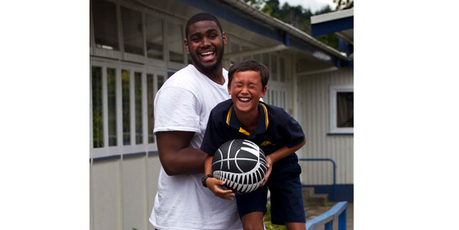
Hamilton
Player drops in at Hamilton school
NY hoops team aim to inspire
HARRY PEARL
Last updated 16:00 13/02/2013
 FAIRFAX NZ
FAIRFAX NZ
Big boy: Joseph Dorsett-Jeffreys stretches his 2.1 metre frame to lift Boston Teio, 5, to the basket at Crawshaw School yesterday.
Basketball player Aaron "The Problem" Williams would still be on the streets of Westchester County, New York, if it wasn't for the game he loves.
Growing up he dreamed of a career in the NBA, but more than anything else, basketball offered him a way out.
"It was an escape for me from the streets, from not doin' nothing," he says.
Williams, along with New York team-mates Dave Seagers and 2.1-metre-tall Joseph Dorsett-Jeffreys, were in Hamilton yesterday, speaking to children at Crawshaw School about the opportunities basketball can provide.
"We help kids out . . . we're giving opportunities for kids coming up without too many options."
Williams grew up "without a lot", and said basketball was his biggest inspiration. As co-founder and star player with street basketball team Team 914, Williams has made a career out of showing kids with backgrounds like his that there is more to life than hanging on the streets and with gangs.
The New York team, who are touring New Zealand, were brought out by There's a Better Way, a charitable trust started by Glen Green three years ago.
Mr Green, 42, described himself as a "troubled youth", and was inspired by basketball in the same way Williams was when he was younger.
"There's a Better Way is a platform where we as the people of New Zealand can come together to find better ways to work with our youth."
- © Fairfax NZ News
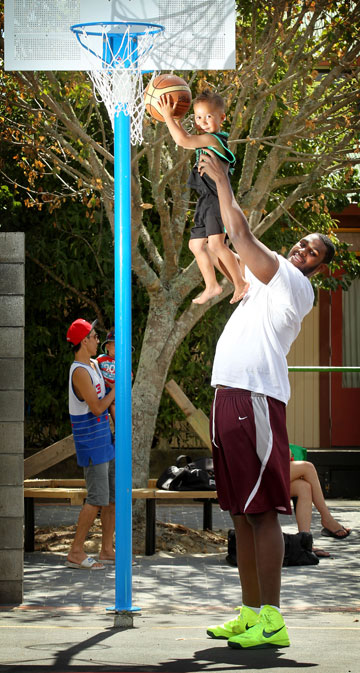
http://www.gisborneherald.co.nz/article/?id=30227 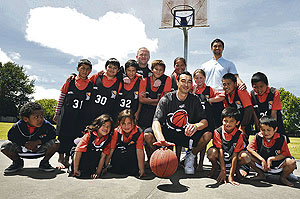 City’s newest gang declares war
City’s newest gang declares war
Wednesday, November 14, 2012 • Louise Hegarty
CRIME, addiction and poverty are all on the hit-list of Gisborne’s newest gang.
There’s a Better Way is a non-profit national charitable trust created to help build positive communities, and create happier and safer places to live.
“Gangs provide role models, a sense of identity and something to do. We do the same thing but in a positive way,” says founder and chief executive Glen Green.
“This is a new gang of positivity, strong in your own mana, strong through community,” he says.
It was established more than two years ago in suburban Auckland.
Mr Green has seen both sides of the law.
“I was a troubled teenager myself. I used to hang out in rubbish dumps in broken cars. Then I started talking to people in the community about why there was a rubbish dump and not a basketball court.”
He wrote a letter to the council and three months later a concreting truck arrived and the rubbish dump was replaced.
“It gave everyone such a positive feeling, we formed a community group and went on from there,” he says.
He went on to become a community constable in the Auckland suburb of Mount Roskill, and quickly noticed a ‘them and us’ mentality between youth and police.
“I changed my shifts so I had time for community interaction, and went and shot baskets with the local youth. Many of them were constantly in and out of police cells. I wanted to work out how they could break the cycle.”
He organised public meetings to involve the community, working with everyone from knitting groups to patched gangs.
“Involving people makes all the difference. It gives them a positive feeling when someone listens and they realise they can make a difference.”
There’s a Better Way has been hugely successful. Mr Green left the police force to work full time on the trust’s growth and new projects, including the touring 3-on-3 basketball tournaments. The pacy new format was played inside the high- security Child Youth and Family (CYF) youth and family justice residence in Rolleston.
“That was pretty cool. The judge who had sentenced some of the offenders was down there playing.”
The organisation is affiliated with FIBA, the international basketball association, and will run a tournament in Gisborne next month.
There’s a Better Way Gisborne area manager is former international and Rising Suns basketballer Travis McIroy, who is committed to the project.
“It’s about community, helping people across the board, making a difference. It’s a really cool thing to be involved in.”
For more information contact theresabetterwaygisborne@gmail.com or the YMCA on 867 9259.
http://www.gisborneherald.co.nz/article/?id=30227
|
12 MAINLAND PRESS THURSDAY AUGUST 16 2012
Basketball programme to help at-risk youth
Tom Doudney
A BASKETBALL
Tournament aimed at inspiring at-risk youths to make positive life choices will be coming to Christchurch next month.
The There’s a Better Way programme began in Auckland two and a half years ago when community constable Glen Green came up with the idea of running a three- on –three basketball tournament for youth in his Mt Roskill beat.
The intention was to counter the local gang culture by providing a positive pathway for success and social interaction, with sponsorship and support provided by local businesses, councils and other organisations.
Since then Mr Green has quit the police force to work full time on the programme, which has expanded to 11 different hubs nationally.
Mr Green said he had been “overwhelmed” with its success, which had included working with the international Basketball Federation and sending a team to compete in the three on three world championships in Russia.
When it was started the crime rate in Mt Roskill dropped and the model won best community project for Auckland City. The video on YouTube got 80,000 hits and we got over 300 phone calls from people saying “we want this in our community.”
Christchurch coordinator Luis Arevalo said nine competitions would be up and running in New Brighton and Bromley starting from Septemember8 and going through to April next year.
In a precursor to that , Mr Arevalo recently brought the programme to the Child Youth and Family (CYF) Youth and Family Justice Residence in Rolleston.
That competition saw a youth judge and former New Zealand basketball player playing alongside some of the youths she had referred to the facility.
It was possible some of those youths would now get to compete in the city- wide tournament, providing they continued to show good behaviour.
CYF resident programme coordinator Kim Harper said the tournament had been a great success with all the participants showing great team work and sportsmanship.
“All in all it was a really fantastic day and basically it has given us a great example of how we want to keep doing things in the future she said.
Mr Arevalo said if the City- wide tournament was successful he hoped to get a South Island team together to compete at the next world championship. The team would have to all its own fundraising.
“It’s not just about skills, it’s about behaviour too, “he said. “ There has to be a work ethic involved as well. It’s about “what can you do for society to start raising funds?” and trying to break some of those chains they’ve got tied to with gangs and anti social behaviour.”
|
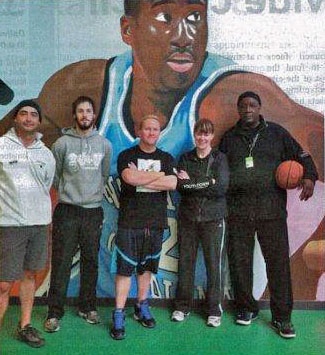 |
Up and running; Luis Arevalo, Linwood youth worker Matt Stevenson, Glen Green, Amanda Murray of Youth Town, and Benny Anthony of Child Youth and Family are among those helping to get There’s A Better Way going in Christchurch. |
DOUBLE TEAM: Ben Anthony, left, and Glen Green are mentors at There's a Better Way
Trusts Stadium will host two 3-on-3 basketball events on June 9 and 16.
http://www.theresabetterway.org.nz/Registration+3on3+FIBA.html
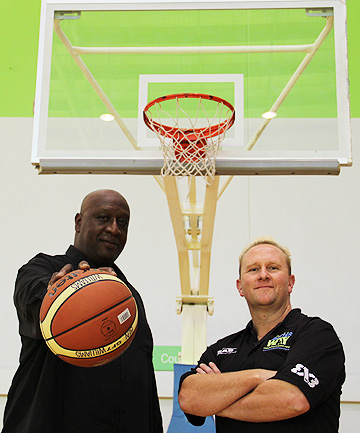
Trusts Stadium will host two 3-on-3 basketball events on June 9 and 16.
The open competition will include a tournament, slam dunk competition and three-point shootout.
Players from all walks of life are encouraged to register and bring along support.
Glen Green and Ben Anthony are mentors involved with There's a Better Way, dedicated to getting troubled youths out of gangs, off the streets and on to the basketball court.
Green grew up in Meadowbank and says he used to be angry.
"You don't know why you're angry," he says.
"Me and my mates used to meet up at the rubbish dump and then go out and get into trouble around the neighbourhood."
Green saw where his life was heading by the age of 15 and decided to change.
He wrote to the Auckland City Council and requested a community basketball centre to be set up.
"I came to realise that if I could focus my energy on something positive we could bring the community together. And that's what it's all about," he says.
Tahapa Cres Reserve in Meadowbank was built three months later and Green received the Good Citizen Award from the council.
Green became a community constable in Mt Roskill and formed There's a Better Way to reach out through 3-on-3 basketball.
He left the police eight months ago and is grabbing There's a Better Way by the horns, driving it to new heights and getting sponsors and players on board.
The organisation recently gained FIBA (International Basketball Federation) endorsement.
But it's not all about basketball.
Better Way's YouTube video about the dangers of P use has had almost 70,000 hits and resulted in 2000 people contacting Green wanting to help out.
Fellow mentor Anthony is from Georgia in the United States and is the father of BJ Anthony, the former New Zealand Breakers power forward.
Anthony has been involved in New Zealand basketball for 30 years. "There's a lot of talent around.
"But a lot of people get into trouble due to boredom," he says.
The game of 3-on-3 is Europe's fastest growing sport and there is a real drive to push it into the 2016 Olympics.
Head to http://www.theresabetterway.org.nz/ to register.
By JULIAN RAETHEL
Better Way storms Northland
HAMISH MACLEAN
SLAM DUNK: There's a Better Way founder Glen Green; dunk contest winner, Northland Sun's Travis McIlroy; Kerikeri There's a Better Way organiser Peter Poharama; and former national basketball team star Benny Anthony celebrate There's a Better Way's arrival in Northland at the Kerikeri three-on-three tournament at the weekend.
Northern News
There's a Better Way established itself in Northland in a big way at the weekend.
The first three-on-three basketball tournament up north was hosted at The Bay Sports Complex in Waipapa on Saturday, May 19, and with nine teams of four or five players each registered, organisers called it a success.
"We were just trying to see who was actually going to turn up," Kerikeri's Peter Poharama says. "It's actually the people who we wanted to see here."
`Real ballers' turned up for the kick off, Mr Poharama says. "This is what it's all about: basketball and the youth."
The next tournament will be held in Kaitaia.
Though Mr Poharama has only been involved with There's a Better Way for two and a half months he's seeing results that have impressed There's a Better Way founder Glen Green.
Mr Green started the FIBA endorsed programme, which is designed to show youth that focussing on sports, such as basketball, can help in all aspects of daily life. Crime rates in Mr Green's home turf of Mt Roskill, Auckland, have dropped significantly since the inception of the programme.
"It's very intense, but at the end of it they shake hands," he says. "The good thing about this event is we've got the high end players, but we've just had the 13-year-old girls win and get involved. It's all age groups getting involved."
The success of the event, he says, is the community involvement. It is friendship and building bridges that he says is the most important outcome of the event.
Local businesses are starting to come on board. And gym hires are being taken care of for the programme by sponsorship support.
Mr Green is confident that Northland will spawn a successful version of what he started in Auckland.
"I think up north here the communication links are stronger, the whanau spread the message very quickly. I think the maraes hear about it and they embrace it. I'd say Northland would be one of the stronger communities that we deal with nationwide when it comes to families and getting involved."
Monthly tournaments are now planned. After the Kerikeri tournament, next month's three-on-three action will be hosted in Kaitaia, then in Whangarei – with Kaikohe a hopeful site for future tournaments. "We're just going to keep rolling it," Mr Poharama says.
Email info.betterway@gmail .com or go to theresabetterway. org.nz for more information.
- © Fairfax NZ News
Basketball ushers in programme
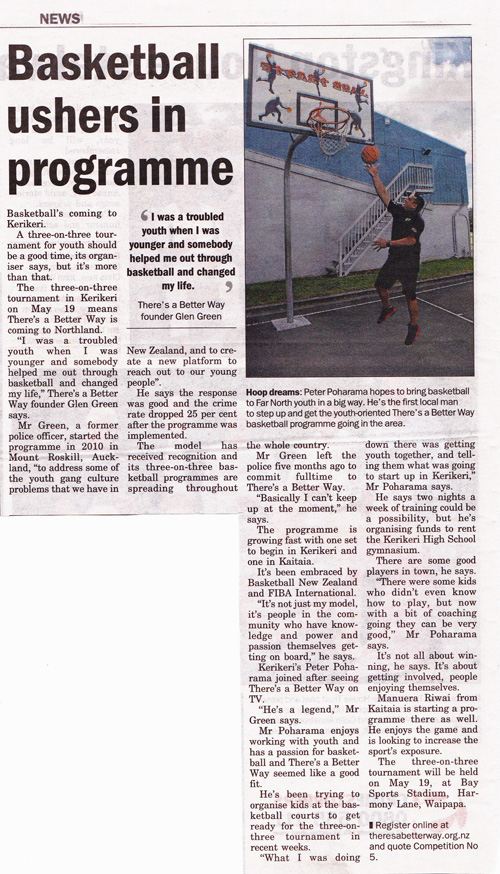 |
|
FIBA News
Go to this Link to view |
3x3 - There is a better way Thank you FIBA
|
http://www.fiba.com/pages/eng/fc/FIBA/fibaProg/3on3/p/newsid/51432/arti.html
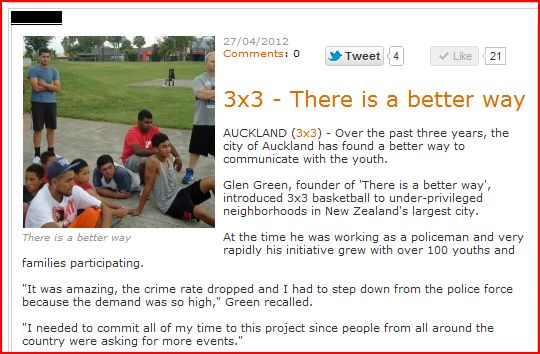 http://bit.ly/Io7o1v
http://bit.ly/Io7o1v
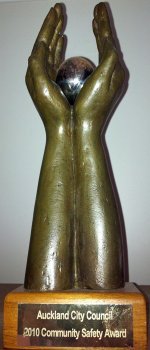
Finding a better way
JANIE SMITH

JASON OXENHAM
MAKING CHANGES: Fred Tanuvasa, left, has decided to give up his gang ties and mentor local youth as part of the There’s a Better Way project, led by Mt Roskill community constable Glen Green, right.
What started out as a weekly game of basketball at the Wesley Community Centre has inspired two young men to sever their gang ties and encourage other locals to make positive changes in their lives.
There's a Better Way is the brainchild of Mt Roskill community constable Glen Green, who has teamed up with the Global Lighthouse Group to work with local youth.
He started out playing basketball with young people at the Wesley Centre in a bid to break down the barriers between police and locals. He now has upwards of 50 people turning up each week to share positive events in their lives.
At the start of the project in January, Mr Green was introduced to Malcolm, an unemployed 19-year-old who had been in trouble with the law.
Mr Green says he asked Malcolm how he could help him, to which Malcolm replied that he wanted to be a fireman, and had never been fishing.
"I approached the Mt Roskill Fire Station who agreed to take him on an initial two-hour training session. He loved getting into the gear and the action."
Mr Green shared the story with his father Gordon, who manages the Tapu Creek Campervan Park in Thames, who offered to take a group of young people, including Malcolm, out fishing and swimming.
Mr Green was also approached by the manager of Gilmours, which supplies drinks for the Thursday evening gatherings, asking if Malcolm would be interested in a job. He is now employed fulltime with Gilmours and has severed his gang ties."For ex-gang member Fred Tanuvasa, being committed to the project has also started a new phase in his life. He became involved through Malcolm and also went on the fishing trip. "He told me what it was all about and just last minute, I went down there," Fred says. "Everything seemed to all come together.
"It's made a big impact on my life. It's made me a better person, a better husband, a better brother, a better father."
Fred also decided to give up his gang affiliations and is now a mentor for local youngsters.
"It was a time in my life that I needed to do it, not only for my family but for myself and the community," he says. "It's where my heart is now."
He understands how many of the local youth feel and it was one of the main reasons he decided to get on board.
"They should be able to have doors opened for them as well," he says. "The media puts them as the worst kids in Auckland. It's about time they were exposed for the good things they do."
He says There's a Better Way has helped break down the barrier between locals and the police and he feels he is now judged as a person, not as an ex-gang member.
"I wouldn't have left everything I had before if I didn't believe in it," he says.
Mr Green says the changes the young men have made in their lives inspire him.
Other community organisations and businesses, including the Mad Butcher, are lending their support and Mt Roskill Community Board recently gave more than $3000 towards adding a Wednesday morning session, where members of the community can visit the centre to talk to Mr Green and find out how they can be involved.
He wants to create a platform where anyone can contribute to building the community, and a model that can be used around the country
TALENT WINS GAMES, BUT TEAM WORK AND INTELLIGENCE WINS CHAMPIONSHIPS
Basketball as a catalyst for social development
A community programme that sees basketball as a catalyst for social development is being expanded across New Zealand with the backing of some of the sport’s biggest supporters.
The initiative, called There’s A Better Way, began in the Auckland suburb of Mount Roskill and is now extending its three-on-three court dreams to seven cities around the country.
At a media launch event on Friday, a number of off-court basketball figures met at an Auckland car yard to hear speeches and watch promotional videos about the programme. Among them were Burton Shipley, who is on the board of Basketball NZ; Paul Bolte, CEO of Bartercard and big-time financial backer of both the NZ Breakers and the national league, the Bartercard NBL; and John McGregor, general manager of the Auckland Pirates.
Breakers development squad player Isaac Fotu, who was recently accepted into Hawaii University, was also on hand, as well as reigning MVP of the NZ NBL, Lindsay Tait.
But the man at the centre of the announcement was 41-year-old Glen Green, an ebullient former police officer who founded There’s A Better Way and now works full-time on it.
Green recounted the story of his own troubles as a teenager and how he got his life together after meeting a mentor figure through playing street ball. Now he works to reach troubled young people in the same way, believing that basketball can be a force for creating positive change and reducing crime rates.
The plan is to start three-on-three basketball programmes in seven cities around New Zealand. FIBA branding is used on the promotional material, but the extent of the association’s involvement was unclear. Bartercard CEO Paul Bolte said FIBA had been impressed with the promotional videos and was enthusiastic about the concept.
Auckland police officer Glen Green has resigned from his job to work as a volunteer on the streets helping at-risk kids to have a better life.
It was a chance meeting. When the police constable with a friendly smile walked up to Mary McGorry one day and asked if she knew anyone in the Mt Roskill community who needed help, the retired assistant principal instantly put up her hand.
Much to her surprise, Constable Glen Green, 31, turned up at her home the next day with a small army of young men, police volunteers, landscapers and businessmen to tackle the tangle of weeds and overgrown plants in the front garden of her home. Like something out of a reality TV show, the team transformed her garden, laid new concrete paths and upgraded her bathroom.
But these volunteers weren't doing it for the cameras. Instead, the eclectic mix of former gang members and teenagers, including a group of Somali youths, had been roped together by the persuasive powers of Green, then stationed at the Mt Roskill Community Policing Centre.
"They were all so passionate about what they did," McGorry says. "Everyone was so happy ... however, what stood out was the wonderful relationship between the police and the children."
Calling his organisation "There's a Better Way", Green set out to convince young people on the street, drawn to drugs, violence and crime, that there were better role models than gangs and those already in trouble.It was that relationship that Green realised he could build on to get troubled kids off the streets and channel their energy into something worthwhile. Using the Wesley Community Centre as a base, he organised them into basketball teams, played touch rugby, and organised barbecues, dance and music.
"It's shocking that when kids in a local primary school were asked their perception of 'what's cool', 180 kids out of 250 said gangs were cool," he says. "Instead of collecting bodies as a police constable, I decided I wanted to put a sign on the top of the cliff saying 'don't take that road'."
Before long, Green realised something had to give. He couldn't hold down a fulltime job in the police force and spend the time he wanted working with the young people who had come to rely on him.
In June, he chucked in his job and hit the streets - using raw energy and his powers of persuasion to drum up support. It wasn't long in coming. Local businessman Bhav Dhillon noticed crime had gone down in his area in the past 18 months and decided to find out who was responsible.
He walked down to the local rugby field to find Green. Dhillon, the managing director of Cemix, asked how he could help.
After learning Green had been funding fishing trips, barbecues and leadership camps out of his own pocket, with some help from his father, Gordon, Dhillon realised the one-man army needed a strategy, sponsorship, help with funding barbecues and mentoring camps and his There's a Better Way website. Together they formed the There's a Better Way Charitable Trust.
Dhillon admits his reasons for helping were partly selfish. "I want my children to be able to walk the streets alone without any fear when they grow up.
"He [Green] is so fired up as he makes inroads in the danger zone, takes risks and breaks the age-old stereotypes."
Since leaving the police, Green, who lives in Titirangi with his partner Michelle, his daughter and two step-children, has been living off savings while he spends long hours at the centre and building up the trust of at-risk youths. Sometimes the difference is as little as fulfilling a dream.
One 19-year-old, in trouble with the law, confessed that he had always wanted to go fishing.
Green's father Gordon, manager of a Thames caravan park, agreed to take him and five mates fishing for the day.
Green later helped the young man get a job and has encouraged him to be a mentor for younger teenagers.
Where once young gang members eyed each other up on the street, now they join nearly 100 young people who play touch rugby and basketball against each other, and get involved in other community events.
One former gang member, Fred Tanuvasa, gave up his patch to work alongside Green as a mentor to local kids. Green's work has come to the notice of Police Minister Judith Collins, Labour leader Phil Goff and other MPs.
He has received hundreds of letters from appreciative families and approaches from communities in Huntly, Wellington and Christchurch who want to replicate the model.
Last month There's a Better Way won the community project category in the Auckland City Community Safety Awards. Green and Dhillon are keen for the model to be replicated in other parts of Auckland. But right now they're searching for sponsorship to support Green's work.
Dhillon: "Once we get them into the ranks and make them realise that there is more to life than unlawful activities and hanging out in a group, we can help them get back into the workforce. I could help by getting them involved as an apprentice or labourers in the construction industry."
Mary McGorry says she feels safer in her home and in the community now. "Earlier we used to hear the police helicopters circle our area all the time but now we seldom hear it. The whole idea of working together to make the community safer for oldies like me is brilliant."
.






